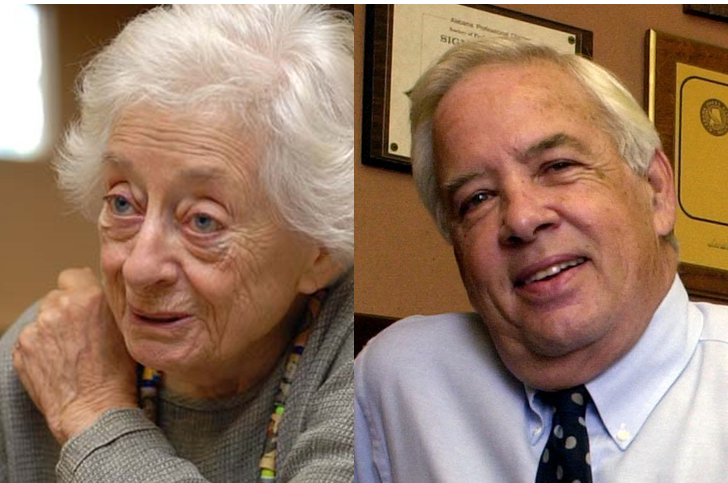Kathryn Tucker Windham, left; Paul Davis, right / Courtesy of the Alabama Press Association
Kathryn Tucker Windham and Paul Davis, both icons in Alabama community journalism, will be inducted into the Alabama Newspaper Hall of Honor during ceremonies at Auburn University on Saturday, April 7, 2018.
Kathryn Tucker Windham began her newspaper career at age 12, reviewing movies for her cousin Earl Tucker’s weekly newspaper, The Thomasville Times.
She graduated from Huntingdon College in 1939 and returned to The Thomasville Times as a freelance writer. In 1940, she was hired by The Alabama Journal in Montgomery as a feature writer and police reporter. She was one of the first women to cover the police beat for a major daily newspaper in the South.
In 1942, Windham moved to Birmingham where she served as publicity director for the Alabama War Bond Committee, and in 1944 she went to work for The Birmingham News, editing state news and aviation and serving as a courthouse reporter.
In 1946, she married Amasa Benjamin Windham, and the couple moved to Selma where they raised their three children. She also wrote freelance articles for Progressive Farmer magazine and many Alabama newspapers. From 1950 to 1966, she wrote a locally syndicated newspaper column “Around Our House.”
After her husband died in 1956, she joined the staff of The Selma Times-Journal, where she worked until 1973.
Along with her newspaper work, Windham wrote 20 books, the most familiar being “13 Alabama Ghosts and Jeffrey.” It was the first in a series of eight books about Jeffrey, the ghost Windham said inhabited her Selma home.
In addition to her writing, Windham was also known for her story telling and radio broadcasts. She was frequently invited to the National Storytelling Festival in Jonesborough, Tennessee and could also be heard on Alabama Public Radio.
Windham was a very talented photographer. She began taking photographs with the Graflex at The Thomasville Times. The first camera of her own was a Brownie she bought in 1930.
Her photographs were included in many showcases including “In View of Home: Alabama Landscape Photographs,” organized by the Huntsville Museum of Art, and “Amazing Alabama,” an exhibition organized for the Retirement Systems of Alabama.
In his nomination, Ed Williams, professor emeritus of journalism at Auburn University, said, “Kathryn Tucker Windham was a dear personal friend and a friend to all of us in Alabama journalism. She truly is one of Alabama’s treasures.”
Like Windham, Paul Davis was a well-known figure in Alabama journalism. He was born in Clanton and grew up in Alberta, just down the road from W. D. Partlow Developmental Center. Davis became a fierce advocate for the patients at both Partlow and Bryce, and as a journalist, uncovered abuses at the facilities that he had witnessed as a child. His work led to the Wyatt v. Stickney case, which set new national standards for the care of the mentally ill and developmentally disabled, requiring the state to provide adequate care.
He began his career in the early 1960s at The Tuscaloosa News as a night shift reporter, and eventually became associate editor. His work was nominated twice for a Pulitzer Prize.
His hard-nosed reporting garnered widespread attention and led to reform of mental institutions nationwide. He defended the people who could not defend themselves.
He was present when George Wallace stood in the door of Foster Auditorium at the University of Alabama to prevent African-Americans from attending the school. Later, when Wallace met with the US Deputy Attorney General, Davis was the only reporter present to cover the meeting.
Davis went on to become editor of The Selma Times-Journal and vice president and general manager of the Natchez (Mississippi) Democrat. He and his wife, Gayle, purchased the Auburn Bulletin and The Tuskegee News, and he was a regular contributor for the Opelika-Auburn News.
Throughout his career, he never gave up his fight to protect those with the mental health issues. He served on the advisory board for the Alabama Department of Mental Health.
In his nomination of his father, Alan Davis wrote, “In every community he called home, he became the driving force in local charities. In Auburn, he helped establish and ramp up the local food bank. In Tuscaloosa, he helped establish a half-way house for those struggling with addiction. He never stopped giving back to those who needed help.”
Davis was awarded the Alabama Press Association’s Lifetime Achievement Award in 2006. He served as president of APA in 1990.
The Hall of Honor ceremony will be held at Auburn’s Ralph Brown Draughon Library on April 7, 2018. Registration begins at 10:15 a.m. and the program will begin at 11 a.m. Invitations will be mailed to all APA members by the University Relations Department at Auburn University.



























